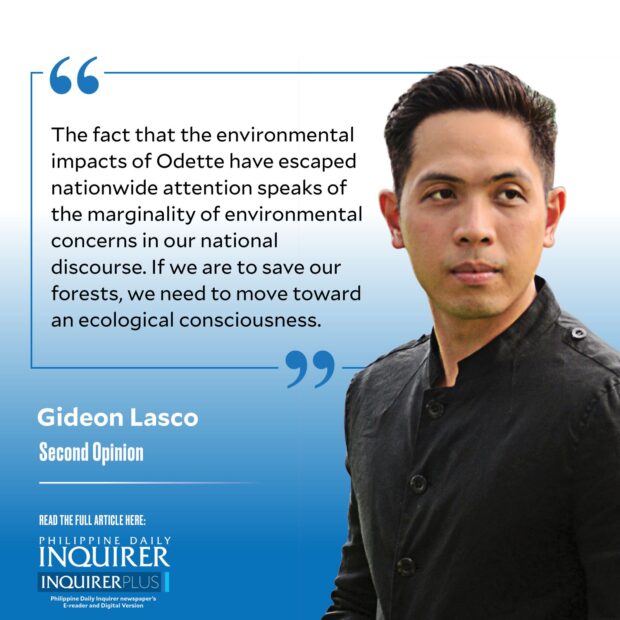Toward Palawan’s green recovery
Puerto Princesa—“For the first time since ‘Odette,’ the mountains are green again, starting just a few months ago,” Jasper Arcinas, a local hiking guide, told me as we stood at the summit of Mount Airy in Barangay Bacungan, one of the numerous peaks within Puerto Princesa. Atop the ultramafic landscape, even with the cloud cover, we could appreciate a landscape as verdant as when I was living in this city almost a decade ago.
Rarely visited and largely undisturbed since the typhoon, Mount Airy reminded me of United States Agency for International Development’s Philippine Sustainable Interventions for Biodiversity, Oceans, and Landscapes’ (USAID SIBOL) green assessment report: “Some forest areas left to recover naturally have fared better, indicating that it is preferable to have minimal and selective management interventions.” I am also reminded that even before Typhoon “Odette,” environmentalists have been advocating for leaving Palawan’s forests alone to regenerate—rather than allowing them to be destroyed and promoting active reforestation.
Article continues after this advertisementStill, the hopeful sight of green mountains can obscure the enduring damage within them. In Mount Airy, fallen trunks continue to block the trails, and many trees, though still standing, are on the verge of falling, weakened by the storm, infested by fungi, raising the risk of forest fires akin to those in the immediate aftermath of Odette.
Worryingly, some species have not returned, including bees whose honey indigenous peoples rely on for livelihood, as well as the avian species that birdwatchers have long been monitoring (and missing). Years ago, I never failed to see snakes, frogs, insects, birds, and other fauna on each hike, but nowadays the mountains seem quieter.
Scientists are aware that Palawan’s “green recovery,” if at all fully possible, will take time and unprecedented effort. Aside from the clearing of debris and controlling opportunistic species, the USAID SIBOL report recommends reforestation and “assisted natural regeneration” (i.e., augmenting recovery by planting native trees and removing barriers to regeneration, among other steps). In all of these, the role of environmental frontliners—i.e., forest guards and rangers—is critical and they must be supported financially, socially, and legally, mindful of the deadly risks they face.
Article continues after this advertisementAt the national level, strengthening the protected area status of the Puerto Princesa Subterranean River National Park and Cleopatra’s Needle Critical Habitat can help facilitate their recovery, and so can establishing more protected areas—hopefully including Mount Victoria and Sultan Peak in Narra. More broadly, the fact that the environmental impacts of Odette have escaped nationwide attention speaks of the marginality of environmental concerns in our national discourse. If we are to save our forests, we need to move toward an ecological consciousness, and indeed, an ecological politics that takes the environment into consideration whether in urban planning or disaster risk reduction.
Ecotourism—which as the pandemic has shown is essential for Palawan’s economic and environmental survival—can help foster this ecological consciousness, while also helping local communities see the value of protecting the environment. For these to happen, however, we need more environmental education, which should include the opportunity for students to actually immerse in nature. We also need more journalism that tells stories—and histories—about the environment; stories that advance environmental justice while explaining why it matters. And we need more environmental scholarship—including from the social sciences and humanities—to more fully document the richness of our forests and the threats they face.
It is heartening that people’s organizations are taking up the challenge of responding to the “ecological emergency.” For instance, groups like the Sabang Sea Ferry Multi-Purpose Cooperative, Community Park Warden Association, Samahan Ng Tribong Tagbanua sa Kayasan, Cabayugan Farmers Association, and Samahang Pagkakaisa ng mga Katutubong Tagbanua sa Marufinas are supporting forest recovery through 500 hectares of assisted natural regeneration and increased forest protection mechanisms, through the support of Forest Foundation Philippines.
Meanwhile, Palawan’s nongovernment organizations are redoubling their efforts to protect Palawan; when I visited Centre for Sustainability PH, Inc., a youth-led environmental nonprofit, their staff spoke about the importance of declaring the mountains of Narra as protected areas, building on their success in having a similar declaration for Cleopatra’s Needle. Farther south, indigenous peoples in Mount Mantalingajan just last week successfully petitioned the Supreme Court to issue a “writ of kalikasan” to protect their communities from mining.
Such efforts make me feel hopeful that, with a renewed sense of urgency in Odette’s wake, and especially with stronger, sustained, support, the fight for the island’s ecosystems remains alive; alive as its wounded but recovering forests; alive as the dream that this island’s future will be as green as its past.
—————-
glasco@inquirer.com.ph

















